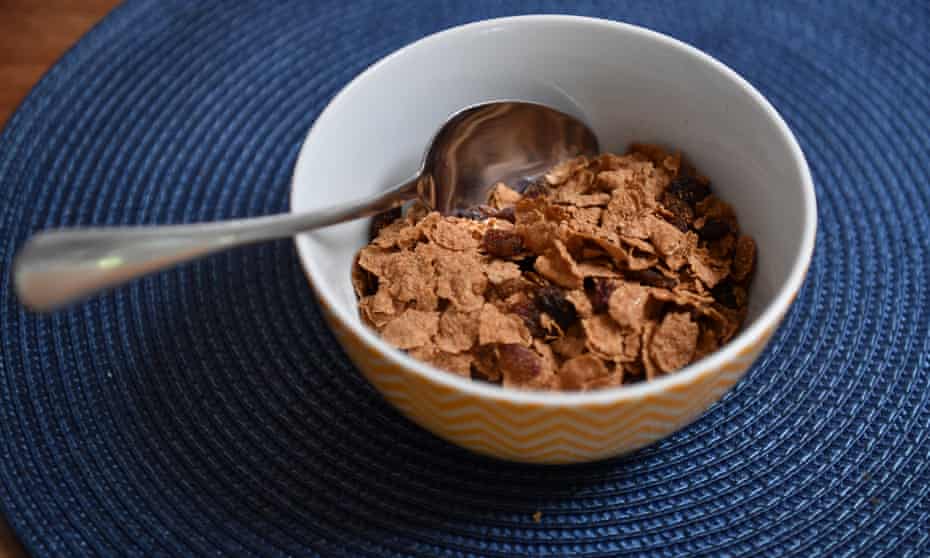UK needs to tax salt in the same way it does sugar, says heart charity
Ministers should bring in levy to cut heart attacks and strokes and address packaged foods’ high salt content, advises BHF

Ministers should bring in a sugar tax-style new levy on the amount of salt in food to reduce heart attacks and strokes, Britain’s leading heart charity has said.
The British Heart Foundation (BHF) urged the government on Tuesday to tax high levels of salt in an attempt to force food firms and outlets to stop adding such large amounts of it to their products.
Many foodstuffs such as breakfast cereals, meat products, cheese and potato-based dishes contain what the BHF said are worryingly high levels of salt. But other food types that are widely seen as quite healthy, such as fish dishes and tinned vegetables, often include a lot of salt.
Per-capita consumption of salt fell across the UK in the early 2000s from over 9g to 8.1g a day when the then Food Standards Agency told food producers to cut the amount they used, using a tough approach lauded by doctors and public health experts. However, progress towards meeting the government’s own target of 6g a day stopped in around 2010 when the Conservative-led coalition government began relying on firms reducing salt voluntarily.
Salt is a major contributor to high blood pressure, the main cause of heart attacks and strokes, which between them claim tens of thousands of lives a year.
Public Health England has estimated that 85% of the salt people ingest is already in food at the point of purchase and consumers only add the other 15% during cooking or at the table.
“Progress in reducing salt in the food we eat has stalled in recent years, and so the government must take lessons from the success of the soft drinks industry levy. We simply must be braver and act now if we’re to overcome this deadly problem,” said Dr Charmaine Griffiths, the BHF’s chief executive.
A new salt tax would help the government achieve its ambition of people having an extra five years of healthy life by 2035, she added. In addition it could lead to 1.4 million fewer people living with high blood pressure, and result in 49,000 fewer strokes and 1,235,000 fewer cases of heart disease by 2035, according to a new analysis by Health Lumen for the BHF.
The sugar tax, which was introduced in 2018, has led to many sugary drinks containing a lot less sugar and is credited with households consuming on average 30g less of it a week than before the levy came in.
Last year’s national food strategy, which the government commissioned from the chef and Leon restaurant chain co-founder Henry Dimbleby, recommended a salt levy. However, it was one of many proposals in the document intended to make British food healthier and more sustainable that ministers decided not to include in the recent white paper on food, which led to claims that they were abandoning potentially effective action against obesity in order to please the food industry.
READ RELATED: 5 Easy Weeknight Dinner Recipes for Weight Loss
Sonia Pombo, campaign manager at Action on Salt, backed the BHF’s call. “Reducing salt is the most cost-effective measure to lower blood pressure and reduce the number of people dying and suffering from strokes and heart disease unnecessarily. The beauty of it is its simplicity. Yet for too long the UK government has allowed the food industry to be in charge of public health at our expense.
“If our ministers are serious about reducing health inequalities, they must now introduce mandatory policy measures for the food industry to reduce the salt that they add to the food we buy, like other countries do successfully,” she said.
The Department of Health and Social Care said that new targets were set in 2020 to reduce the salt content of commonly eaten foods by 2024 and that “we continue to work in partnership with the food industry to achieve these”.
“We will set out further action on levelling up the nation’s health and tackling disparities through a white paper later this year,” the spokesperson added.
Britain’s saltiest foods, according to the British Heart Foundation
-
Cereals: already known to contain large amounts of sugar, many have a lot of salt in them too.
-
Cold meats: while some taste salty, such as smoked or cured meats, others such as turkey or chicken slices contains what the BHF calls “lots of sneaky salt”.
-
Cheese and butter: well known for often being high in saturated fat, but many have worryingly high levels of salt too.
-
Potato snacks: crisps and portions of pre-salted chips are among the worst offenders in this category.
-
Bread: consumers should beware of the salt levels in loaves and rolls that have salt sprinkled on top or are studded with olives, the BHF advises.
-
Nibbles: capers, anchovies and olives all increase a food’s salt content.
Source: Health & wellbeing | The Guardian








